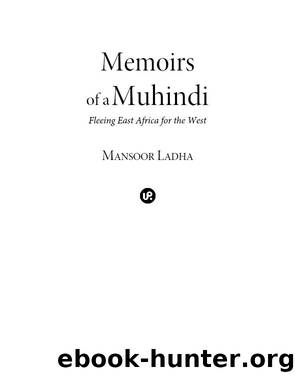Memoirs of a Muhindi by Mansoor Ladha

Author:Mansoor Ladha
Language: eng
Format: epub
Publisher: University of Regina Press
Published: 2017-02-10T18:02:40+00:00
* * *
5 Haroub Othman, “Mwalimu Julius Nyerere: An Intellectual in Power,” in Yes, In My Lifetime: Selected Works of Haroub Othman, ed. Saida Yahya-Othman (Dar es Salaam: Mkuki na Nyota), 98.
Life as a Journalist
One morning, Brandon Grimshaw, the Standard’s editor, sent me to the Tanzania Information Services office to fetch a press release the government was issuing on expelled students. President Nyerere had decided to pardon the students who, one year earlier, had demonstrated against the national service. I was obviously an interested party.
As soon as I got the package, which contained a list of pardoned students, I started flipping pages, searching for my name, but I couldn’t find it. I returned to the intro of the press release, and there I read that President Nyerere had pardoned all expelled students except the six “ringleaders,” which, of course, included me. For a moment, I froze. The government was unnecessarily making a scapegoat of us. I felt pity for myself and disgust at this treatment. How could the president be so ruthless? Did he have no compassion? He had already cost us a year. Wasn’t that punishment enough? Indeed, the wrath of the president had no limits, no bounds! He was merciless and insensitive.
Disappointed, dejected, and deep in my thoughts, I returned to the newspaper office and told Grimshaw of the news contained in the press release. “Now I can’t go back to the university,” I said with a sad face, tears welling up.
The editor looked at me in a fatherly manner, placed his hand on my shoulder, and said, “You have nothing to worry about, bud. We are your family and you have made good progress with us. We’ll take care of you. This is your home. Welcome to the Standard family.” He smiled. “Mansoor, drink a glass of water, compose yourself, and write the story. It’s your story, bud,” he said and then vanished into his office.
Yes, I became the story. In that emotionally drained condition, I sat in front of my typewriter, took a deep breath, and started typing the first sentences of the story for the next morning’s edition:
President Julius Nyerere yesterday pardoned over 230 Tanzanian university students who were expelled last October for demonstrating against the government’s policy of national service. Excluded in the presidential pardon were the six members of the Tanzania university student union executive, who were branded by the government as ringleaders, and blamed for organizing the demonstration.
While writing the story, I had to keep my personal feelings and emotions in check. The piece made the next morning’s front page with my byline. It was perhaps one of the most difficult stories of my career thus far. Considering the story affected me personally, it was difficult to write. I was glad it didn’t make me cry. After I finished the piece, the editor took me to the city’s popular Gymkhana Club—where non-whites had once been barred—for a drink. He instilled in me that journalism is a great career and that I had a great future in it.
Download
This site does not store any files on its server. We only index and link to content provided by other sites. Please contact the content providers to delete copyright contents if any and email us, we'll remove relevant links or contents immediately.
| Arms Control | Diplomacy |
| Security | Trades & Tariffs |
| Treaties | African |
| Asian | Australian & Oceanian |
| Canadian | Caribbean & Latin American |
| European | Middle Eastern |
| Russian & Former Soviet Union |
The Secret History by Donna Tartt(16727)
The Social Justice Warrior Handbook by Lisa De Pasquale(11508)
Thirteen Reasons Why by Jay Asher(7835)
This Is How You Lose Her by Junot Diaz(5830)
Weapons of Math Destruction by Cathy O'Neil(5082)
Zero to One by Peter Thiel(4869)
The Myth of the Strong Leader by Archie Brown(4810)
Promise Me, Dad by Joe Biden(4481)
Beartown by Fredrik Backman(4466)
How Democracies Die by Steven Levitsky & Daniel Ziblatt(4450)
Stone's Rules by Roger Stone(4440)
The Fire Next Time by James Baldwin(4376)
100 Deadly Skills by Clint Emerson(4112)
A Higher Loyalty: Truth, Lies, and Leadership by James Comey(4061)
Rise and Kill First by Ronen Bergman(4050)
The David Icke Guide to the Global Conspiracy (and how to end it) by David Icke(3917)
The Farm by Tom Rob Smith(3896)
Secrecy World by Jake Bernstein(3811)
The Doomsday Machine by Daniel Ellsberg(3761)
